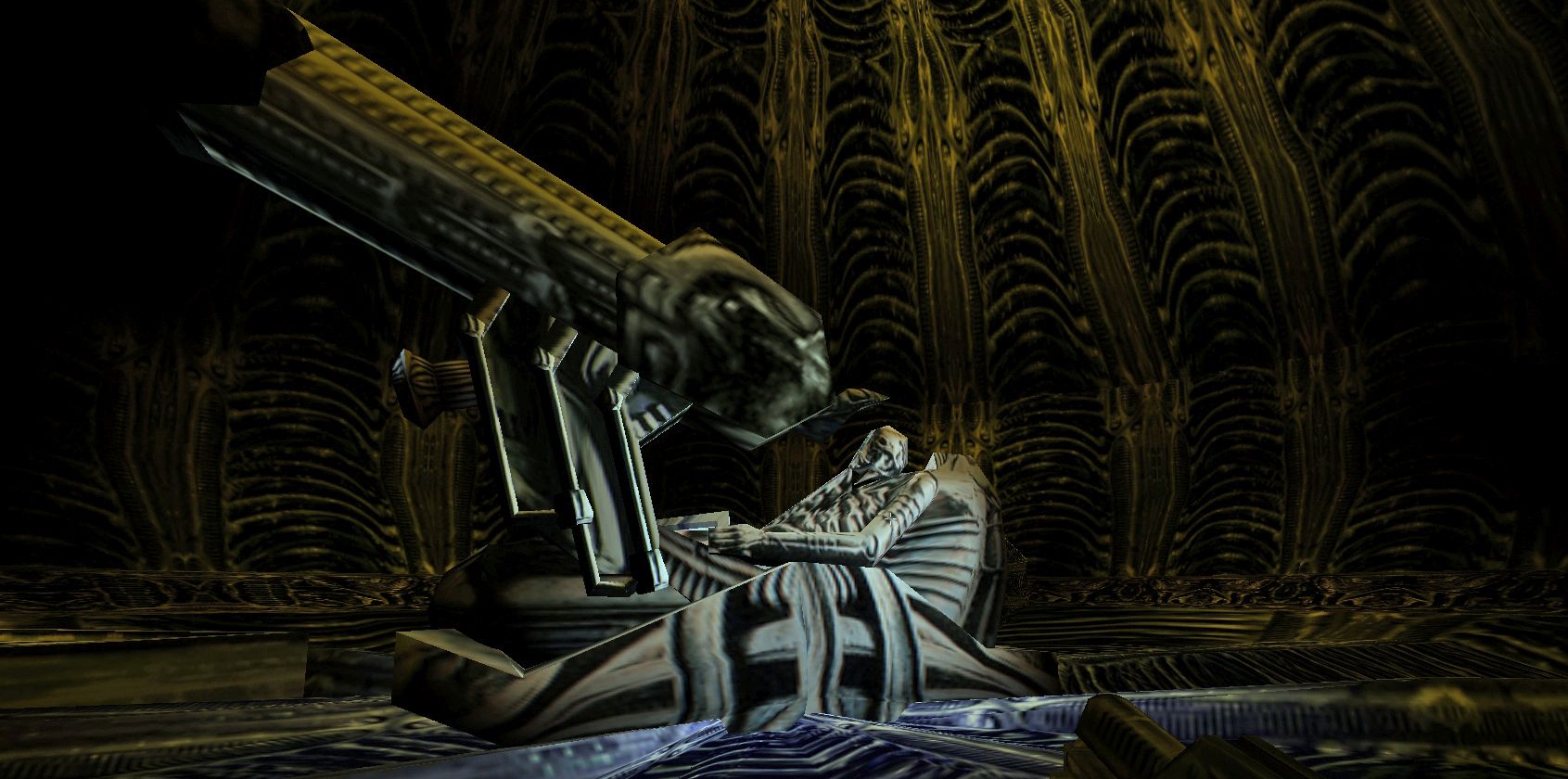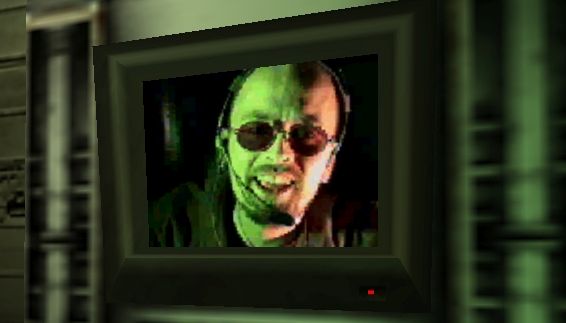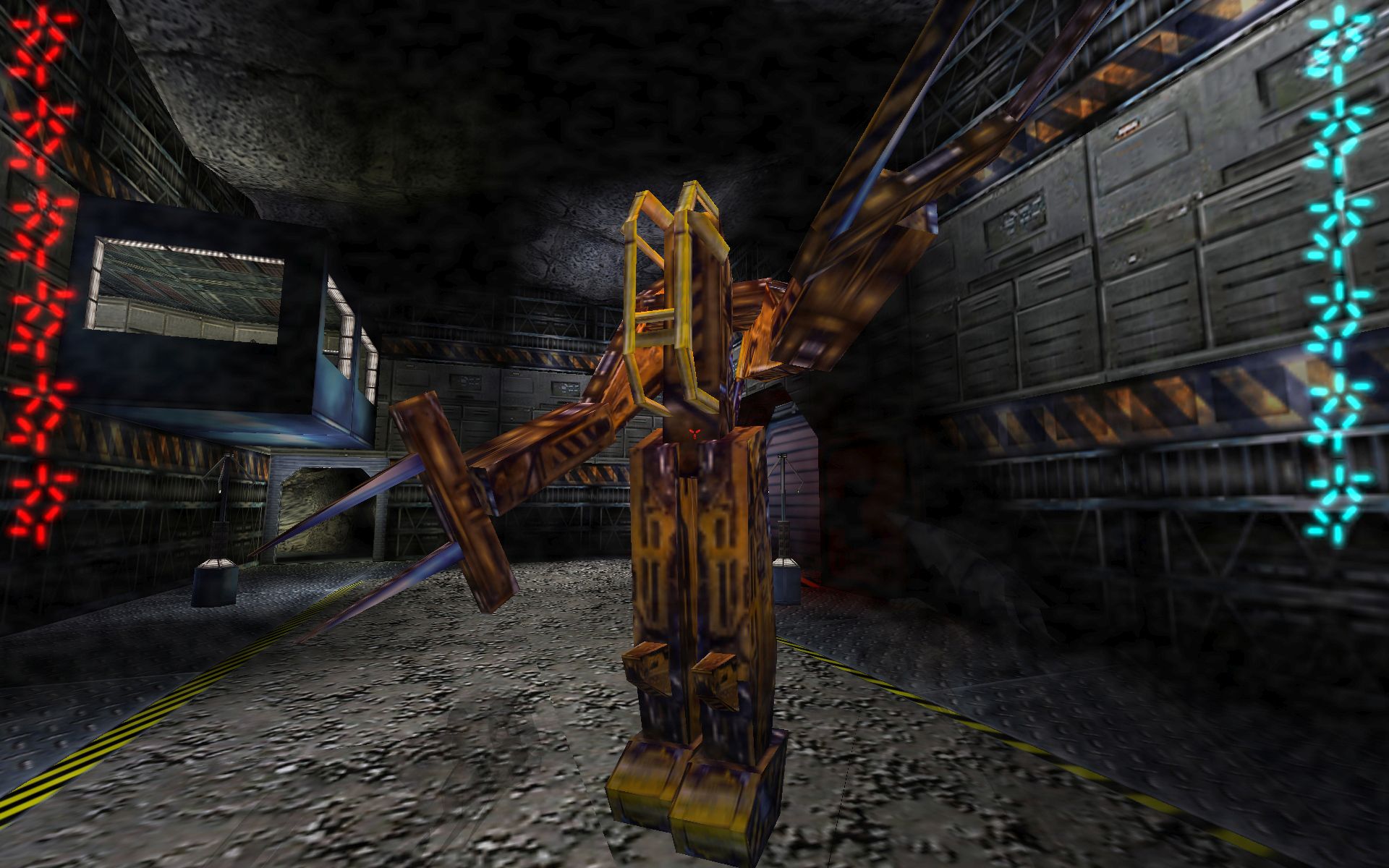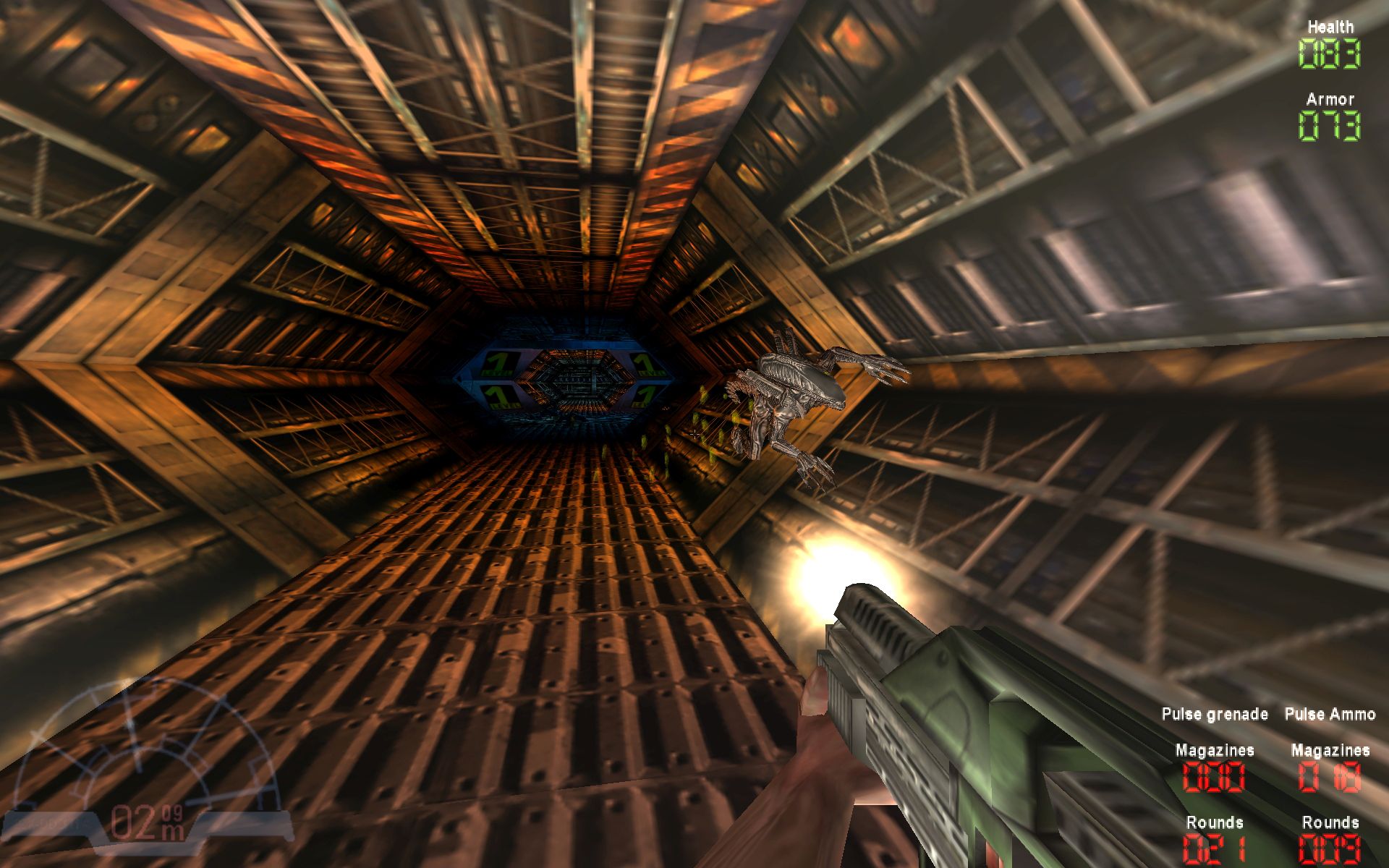Aliens Versus Predator has gone a bit silly in its old age
Reinstall.

Reinstall invites you to join us in revisiting PC gaming days gone by. Today, Chris finds comedy in the old corridors of Aliens Versus Predator.

SHIP CAPTAIN
Going for: Calculating pragmatism disguised as professionalism.
Gets: Concerned supply teacher.
AREA 52 BASE COMMANDER
Going for: Experienced and undaunted senior officer.
Gets: Overenthusiastic first-time paintballer.
TEMPLE COMMANDER
Going for: Mid-ranking officer in high pressure situation.
Gets: Local man cannot get a refund in HMV.
I didn't expect to laugh out loud within a few seconds of revisiting Aliens Versus Predator. I remember this game being too scary to play. I remember the beeping of the motion tracker, the dingy corridors of Hadley's Hope, the terror of meeting a facehugger in the dark. I remember the cathartic thrill of becoming a xenomorph and the rush of terrorising marines as the predator. This was, in my head, one of the great atmospheric shooters, and I revisited it in the hope of rediscovering those strengths. That bubble burst the moment the first in-game video flickered to life.
The original version of Aliens Versus Predator had alright-for-the-'90s FMV sequences that played on in-game screens to usher you from one objective to the next. I'd forgotten about them entirely, and in their initial form they are entirely forgettable. No longer. For the Aliens Versus Predator Gold re-release of the game—as well as the Aliens Versus Predator Classic 2000 version available on Steam—these were replaced with higher-quality videos produced by the development team. Think Command & Conquer with British game developers adopting the roles normally reserved for F-list American actors. They are hilariously, lovably shit, and they sunder the game's atmosphere entirely.
In the initial missions of the marine campaign you're handed instructions by a slightly doughy sergeant who holds a cigar like a marker pen and bobs his head about like he's sitting in a deflating bouncy castle. He's supposedly American but says entire sentences with a light Welsh accent; the notable exception being a single missive where he decides, inexplicably, to be from New York. It's delightfully camp, and utterly dashes any hope the game might have had of holding on to the tone of the movies. I'm not sure why Rebellion decided to re-record the FMV in this way. The production values are slightly higher, but the acting is so silly that I want to give them the benefit of the doubt and say that it was a deliberate act of sabotage. They knew the game's atmosphere wouldn’t stand the test of time, so they turned AvP Gold into a comedy. That's the charitable interpretation, anyway.
This was a hugely technically accomplished game when it was released, and it's important not to lose sight of work that went into realising three diverse player-characters, large maps with extensive dynamic lighting, and an AI system that was just about capable of supporting a linear campaign as well as a freeform skirmish mode. I dare say it earned its 90% from PC Gamer at the time. Today, however, those novelties have worn off.

Structurally, this is still a first-person shooter about defeating enemies on the way to finding the switches you need to open the next door. Even as the alien, levels are fundamentally mazes to be unpicked piece by piece, with difficulty enforced by the limited number of saves you are given. The biggest problem is that these mazes are not particularly good. Between bouts of action there's a lot of fussy busywork finding the next path or completing objectives exactly as the game expects—whether that's destroying one more pipe to trigger the next section of an alien level or zipping about a xeno-infested colony to find that one switch you missed as a marine.
The fact that the AI is capable of surprising you is still a positive, but it's inconsistent in a bad way: aliens run into walls, civilians drop firebombs on themselves and burn to death, some marines will barely get a shot off if you run them through with your predator claws while others will stand and fire, seemingly invulnerable, until you lose the war of attrition. The alien campaign actually holds up fairly well because of this, as you dismember people so fast you've hardly got time to consider the flaws.
Keep up to date with the most important stories and the best deals, as picked by the PC Gamer team.
This was the era before the developers of first-person games started to seriously consider how to embody the player in the character they controlled. Aliens Versus Predator's atmospheric ambitions are built on the movement and combat structures of Quake, and coming back to it in the modern day is deeply jarring. As an alien, your incredible velocity makes some sense although it can be disorientating in narrow spaces. You're faster than the creature in the films ever was, but there's a sense of power in shooting through the innards of a ship like an F-22 that eats people's faces. As a marine, your extreme freedom of movement contributes to the game's lack of tension. You're basically playing a man with a gun on a go-kart who is occasionally inconvenienced by a geriatric-looking alien. Given that you can strafe and backpedal as fast as you can shoot, combat lacks impact.

None of this takes away the effect that AvP had on players when it was released, nor does it detract from the tremendous impact that the game subsequently had. It hasn't aged well, and that has made me realise just how reliant certain types of horror game are on the technology of their time. Games like Aliens Versus Predator that set out to immerse the player in familiar settings depend tremendously on your ability to believe in those settings. AvP's movement and combat model, visuals and map design have all been exceeded so many times that they no longer feel like they used to.
Humour, as it happens, does survive the march of technology—any classic point-and-click is a testament to that, as are AvP's FMV sequences. You may no longer find very much to scare you in those early Marine missions, but I can guarantee that they'll make you laugh.
Joining in 2011, Chris made his start with PC Gamer turning beautiful trees into magazines, first as a writer and later as deputy editor. Once PCG's reluctant MMO champion , his discovery of Dota 2 in 2012 led him to much darker, stranger places. In 2015, Chris became the editor of PC Gamer Pro, overseeing our online coverage of competitive gaming and esports. He left in 2017, and can be now found making games and recording the Crate & Crowbar podcast.


